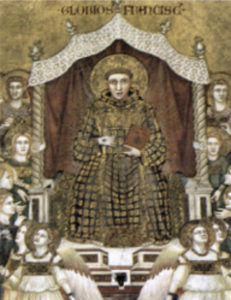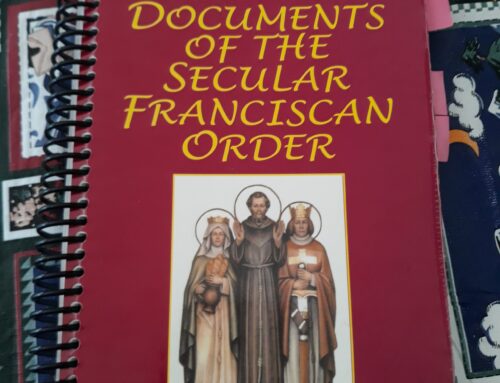
This is an excerpt from a series of articles by the late Deacon Tom Bello, OFS, former Minister of the National Secular Franciscan Order – USA. “Many of these essays were originally published in TAU-USA, our national newsletter,” said Jan Parker, OFS, current National Minister. “They are excellent for reflection and ongoing formation.” Jan helped Tom publish these essays in book form. It is called For All The Saints: St. Francis’s Five-Point Plan for Salvation and is available from Tau Publishing. These excerpts will appear several times a week on the Secular Franciscans website.
By Deacon Tom Bello, OFS
As I have said many times, we are wasting each other’s time in fraternity if we are not, as good Secular Franciscans, trying to bring each other to salvation. Please permit me to do my part and share with you Saint Francis’s Five-Point Plan for Salvation, found in the very first words of the Prologue in our Secular Franciscan Rule:
“All who love the Lord with their whole heart, with their whole soul and mind, with all their strength (cf. Mk 12:30), and love their neighbors as themselves (cf. Mt 22:39) and hate their bodies with their vices and sins, and receive the Body and Blood of our Lord Jesus Christ, and produce worthy fruits of penance.
Oh, how happy and blessed are these men and women when they do these things and persevere in doing them, because ‘the spirit of the Lord will rest upon them’ (cf. Is 11:2) and he will make ‘his home and dwelling among them’ (cf Jn 14:23), and they are the sons of the heavenly Father (cf. Mt 5:45), whose works they do, and they are the spouses, brothers, and mothers of our Lord Jesus Christ (cf. Mt 12:50).”
Point One: “Love the Lord with (our) whole heart, with (our) whole soul and mind, with all (our) strength” (cf. Mk 12:30).
Our Lord in St. Mark’s Gospel (12:30) quotes the great “Shema” or “Call” from Deuteronomy. Scholars have argued that this great “Shema” is the heart of the whole Jewish Torah, and the heart of this “Shema” is love: “Hear, O Israel! The LORD is our God, the LORD alone! Therefore, you shall love the LORD, your God, with your whole heart, and with your whole being, and with your whole strength” (Deuteronomy 6:4-5).
As Sister Ilia Delia shared with us at the Q, St. Francis’s prayer before the Crucifix at San Damiano begins, “Most High, glorious God, enlighten the darkness of my heart.” Sister Ilia went on to explain that the heart is the key to St. Francis, not the mind; and love is the highest good. To St. Francis, love is the deepest form of knowledge, for love offers the knowledge and power of God, Who is love (1 John 4:8, 16), a relational love in the Blessed Trinity, an outward-moving love toward all Creation.
Thus, Point Two: “Love (our) neighbors as (our) selves (cf. Mt 22:39).”
We know we cannot love the divine God we cannot see if we do not love our sisters and brothers whom we do see. That self-giving love must start with the love God has already given us in creating and sustaining us, and with that divine spark in our spirits, minds and hearts, we must try to reflect, in our feeble, human way, God’s love for all of Creation by our love for one another.
Nothing can be more important than Love, Which comes from God, Which is God, Which reaches out to our sisters and brothers, and Which returns to God, Love without end, Love without sin.
Thus, Point Three: “Hate (our) bodies with their vices and sins” does not mean that we hate ourselves. Rather, we hate anything within us that might separate us from God since nothing outside us can ever separate us from the Love of God. As Saint Paul wrote, “For I am convinced that neither death, nor life, nor angels, nor principalities, nor present things, nor future things, nor powers, nor height, nor depth, nor any other creature will be able to separate us from the love of God in Christ Jesus our Lord” (Romans 8:38-39).
We all know we have three great enemies: the devil, the world and the flesh, and perhaps the most tempting of these enemies is within us, in our fallen natures. Again, as St. Paul confessed, “I do not do the good I want, but I do the evil I do not want . . . taking me captive to the law of sin that dwells in my members (Romans 7:19, 23). We must actively hate, or fight against, anything in us that would push out the Indwelling of the Holy Spirit and turn us toward the devil and sin. St. Paul knew it was not easy struggling against him: “Miserable one that I am! Who will deliver me from this mortal body? Thanks be to God through Jesus Christ our Lord” (Romans 7:24-25).
Thus, Point Four: “Receive the Body and Blood of our Lord Jesus Christ.”
Since Christ Himself proclaimed in all truth, “I am the way and the truth and the life” (John 14:6), and as St. Francis wrote in his Testament, “in this world I cannot see the most high Son of God with my own eyes, except for his most holy Body and Blood,” then we must cling to Christ: Body, Blood, Soul and Divinity in the Most Blessed Sacrament.
As the Testament continues: “Above everything else, I want this most holy Sacrament to be honored and venerated.” Christ is our only hope against the devil, a fallen angel far superior to us, yet vastly inferior to God. Christ is our sure defense against the world with its “sensual lust, enticement for the eyes and a pretentious life” (1 John 2:16). Christ alone is the one way out from self and sin as He urges us to a daily, ongoing conversion: “The Kingdom of God is at hand. Repent, and believe in the gospel” (Mark 1:15).
What else is there to do?
Well, Point Five: “Produce worthy fruits of penance.”
For the rest of our lives, as Brothers and Sisters in Penance, anything that turns us closer to God and away from sin is a worthy fruit of penance. Certainly, the great fruits of the Holy Spirit offer focus here: “love, joy, peace, patience, kindness, generosity, faithfulness, gentleness, self-control” (Galatians 5:22-23).
Again, we start with love. We are called to “rejoice always” (1 Thessalonians 5:16). As good Franciscans, we must be instruments of the Lord’s peace; and to do so, we need unending patience and kindness. Our hearts must be like the Lord’s: generous, faithful and gentle. We must exhibit self-control.
As St. Paul said, “Against such there is no law” (Galatians 5:23).
Interestingly, St. Paul goes on to say, “Now those who belong to Christ [Jesus] have crucified their flesh with its passions and desires. If we live in the Spirit, let us also follow the Spirit” (Galatians 5:24-25), leading us to conclude where we began: with the Prologue.
Through the Indwelling of the Holy Spirit at our Baptisms, as children of God and “spouses, brothers, and mothers of our Lord Jesus Christ,” we love God first, and with God’s love, love one another as we love ourselves. We consciously fight to turn away from sin with the direct help of Christ in the Blessed Sacrament. We produce worthy, lifelong fruits of penance.
Of course, the three chapters and twenty-six paragraphs of our Secular Franciscan Rule that follow these initial words will detail the living out of this Five-Point Plan of Salvation. The focus is Christ. The end is salvation. The way is love.
Reflection Questions
- Where can one find St. Francis’s Five Point Plan for Salvation?
- What is the First Point? Explain it in your own words.
- What is the Second Point? Explain it in your own words.
- What is the Third Point? Explain it in your own words.
- What is the Fourth Point? Explain it in your own words.
- What is the Fifth Point? Explain it in your own words.
- Which one point (choose only one) is most important or most vital to you at this point in your Franciscan journey closer to God through Christ? Why?



Leave A Comment